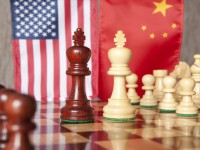Zhai Kun, Professor at School of International Studies; Deputy Director of Institute of Area Studies, Peking University
Jan 16, 2015
In 2015, ASEAN will continue to pursue its priority objective of creating an ASEAN community. As China sees it, the creation of a China-ASEAN community with a shared destiny now stands at a new historical starting point. China will advance and be proactive in its diplomacy. What will ASEAN choose?

Shi Yinhong, Professor, Renmin University
Oct 30, 2014
How can Beijing manage relations with both the United States and its regional neighbors in the Asia-Pacific? Shi Yinhong examines China’s foreign policy and offers insight into both US-China relations and China’s relationship with other Asian nations.
Dan Steinbock, Founder, Difference Group
Oct 22, 2014
The proposed Asian infrastructure bank could galvanize growth in emerging Asia and boost lingering global recovery.
Wu Jianmin, Former President, China Foreign Affairs University
Oct 22, 2014
In response to U.S. suspicions over China’s establishment of an Asia Infrastructure Investment Bank, Wu Jianmin lays out three reasons why the project would be a win-win for the Asia-Pacific region and the United States’ regional allies.
Oct 10, 2014
Haiyang Shiyou 981 (HYSY 981) is a state-of-the-art, semi-submersible oil platform – the first of its kind for the China National Offshore Oil Corporation. Zheng Wang and Andrew Ludwig explore the HYSY 981 and discuss whether it will enhance political cooperation or fuel greater tensions in the South China Sea.
Wu Zurong, Research Fellow, China Foundation for Int'l Studies
Sep 18, 2014
Only by getting to know China in an entirely new light, can the US formulate a sensible China policy and produce a win-win situation for both China and the US in the South China Sea, writes Wu Zurong.
Sep 15, 2014
China’s rising power and capabilities make PRC actions in the South China Sea more consequential and unsettling than those of others, so they deserve particular attention but need to be evaluated in the broader context of the motives and actions of others as well.
Mel Gurtov, Professor Emeritus of Political Science, Portland State University
Sep 02, 2014
While the United States continues to try and resolve disputes in the South China Sea to protect the security of established sea routes and ports, China finds the situation to be stable. Dismissing any alleged tensions, China claims that it and ASEAN do not need U.S. interference to help rectify the so-called dispute.
Zhai Kun, Professor at School of International Studies; Deputy Director of Institute of Area Studies, Peking University
Sep 01, 2014
On the chessboard of the South China Sea, spectators have turned into players and the game is expanding, writes Zhai Kun.
Stewart Taggart, Founder & Principal, Grenatec
Aug 26, 2014
Can a market-based plan for energy infrastructure provide peace and prosperity in the South China Sea? Stewart Taggart, a former financial journalist, examines recent tensions and describes how creating Joint Development Areas could boost cooperation and mutual trust.
Back to Top

- China-US Focus builds trust and understanding between the U.S. and China through open dialogue among thought leaders.
- Our Offerings
- Topics
- Videos
- Podcasts
- Columnists
- Research Reports
- Focus Digest
- Stay Connected
-
Thanks for signing up!
- Get the latest stories from China-US Focus weekly.